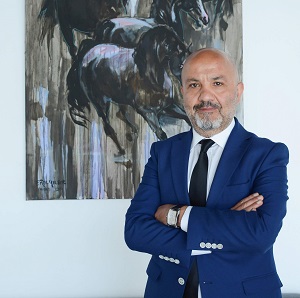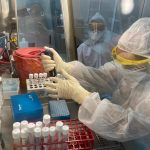
The characteristics of COVID-19 cases in the Turkish Republic of Northern Cyprus were investigated with the coronavirus study conducted at the COVID-19 PCR Diagnostic Laboratory of the Near East University DESAM Research Institute.
According to the research results shared with the scientific world at the Turkish Microbiology Society (TMC) 2020 Online Microbiology Symposium, which was held between December 25-27, it was found out that COVID-19 cases were mostly symptom-free or mild in the TRNC. It was emphasized that the amount of virus detected in respiratory tract samples of asymptomatic cases is similar to people with symptoms, which may cause COVID-19 to spread faster. As of December 29, there are 217 active cases in the TRNC.
The "Clinical and Molecular Evaluation of SARS-CoV-2 Infected Asymptomatic and Symptomatic Cases" study announced by the COVID-19 PCR Diagnostic Laboratory of the Near East University DESAM Research Institute was jointly conducted by Prof. Dr. Tamer Şanlıdağ, Prof. Dr. H. Kaya Süer, Prof. Dr. Murat Sayan, Assoc. Prof Dr. Buket Baddal, Assoc. Prof. Dr. Mahmut Çerkez Ergören, Assoc. Prof. Dr. Pınar Tülay, Assist. Prof. Dr. Ayşe Arıkan, and Dr. Emrah Güler.
The research was carried out by evaluating the results obtained from 1071 patients who applied to the Near East University Hospital and Dr. Suat Günsel University of Kyrenia Hospital between July 28 - October 10, 2020, with complaints of cough, weakness, fever, nasal congestion, sore throat, loss of sense of smell and taste, and muscle / joint pain symptoms, or who are healthy and only had COVID-19 PCR test.
No contact history in 59% of cases
As a result of the tests, 91 cases were found to be positive. While 40 of the cases showed mild or moderate symptoms, 51 did not show any symptoms. The most common symptoms were fever and asthenia at 21 percent and cough at 14 percent. The rate of asymptomatic people who had the disease and did not show any symptoms was 56 percent. In the study, which was stated that SARS-CoV-2 positive cases were between the ages of 2-57, the mean age range of asymptomatic and symptomatic cases was found to be 31-33. 33 identified cases are from Cyprus, 42 are from Turkey, and 16 are from different nationalities. In the COVID-19 cases seen, the rate of men was found to be 67 percent and the rate of women was 33 percent.
According to the results of the research, it was determined that the rate of patients with a history of contact with the virus remained at 41 percent, while 59 percent did not know where they got the virus. It was pointed out that the virus load, ie the amount of virus carried in the respiratory system, is the same in symptomatic cases and asymptomatic cases, so asymptomatic people may be effective in increasing local contamination.
We should not be compromised
Near East University DESAM Institute Director Prof. Dr. Tamer Şanlıdağ emphasized that despite the increase in local cases in recent days, TRNC is one of the safest countries in the world, and emphasized that the measures should be continued without complacency.
Noting that the problem will not be solved unless the rules are followed, Prof. Dr. Tamer Şanlıdağ said, "We will be protected to a great extent as long as we wear a mask". Drawing attention to the fact that the society is more sensitive when wearing a mask is not mandatory, Prof. Dr. Şanlıdağ underlined that increasing individual measures is important for public health. In the continuation of his words, he warned that "Those who intervene in the public without waiting for the test result should take personal responsibility".
Flu and COVID-19 tests are launched
Noting that not every symptomatic person has COVID-19, Prof. Dr. Şanlıdağ said that they will initiate 'Molecular Tests' in order to determine the difference between virus and flu. Prof. Dr. Şanlıdağ said, "Even the virus that causes a simple cold can show symptoms similar to COVID-19. "We will initiate molecular tests to differentiate COVID-19 from influenza (flu) and determine which treatment should be applied," he said.

